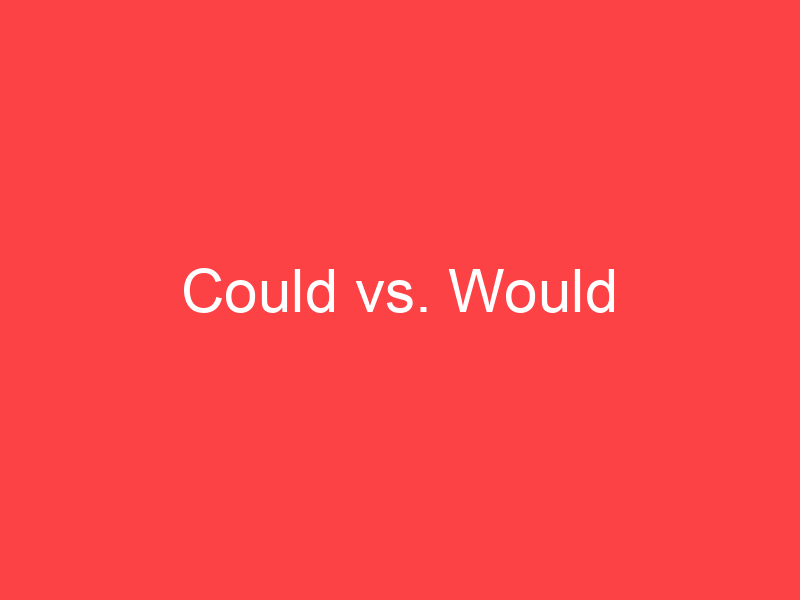-
Could (verb)
conditional of can
-
Could (verb)
Used as a past subjunctive (contrary to fact).
“I think he could do it if he really wanted to.”
“I wish I could fly!”
-
Could (verb)
Used to politely ask for permission to do something.
“Could I borrow your coat?”
-
Could (verb)
Used to politely ask for someone else to do something.
“Could you proofread this email?”
-
Could (verb)
Used to show the possibility that something might happen.
“We could rearrange the time if you like.”
-
Could (noun)
Something that could happen, or could be the case, under different circumstances; a potentiality.
-
Would (verb)
As a past-tense form of will.
-
Would (verb)
Wished, desired (something). 9th-19thc.
-
Would (verb)
Wanted to ( + bare infinitive). from 9thc.
-
Would (verb)
Used to; was or were habitually accustomed to ( + bare infinitive); indicating an action in the past that happened repeatedly or commonly. from 9thc.
-
Would (verb)
Used with bare infinitive to form the “anterior future”, indicating a futurity relative to a past time. from 9thc.
-
Would (verb)
Used with ellipsis of the infinitive verb, or postponement to a relative clause, in various senses. from 9thc.
-
Would (verb)
As a modal verb, the subjunctive of will.
-
Would (verb)
Was determined to; loosely, could naturally have been expected to (given the tendencies of someone’s character etc.). from 18thc.
-
Would (verb)
Used to give a conditional or potential “softening” to the present; might, might wish. from 9thc.
-
Would (verb)
Used as the auxiliary of the simple conditional modality (with a bare infinitive); indicating an action or state that is conditional on another. from 9thc.
-
Would (verb)
Might wish ( + verb in past subjunctive); often used in the first person (with or without that) in the sense of “if only”. from 13thc.
-
Would (verb)
Used to impart a sense of hesitancy or uncertainty to the present; might be inclined to. Now sometimes colloquially with ironic effect. from 15thc.
-
Would (verb)
Used interrogatively to express a polite request; are (you) willing to …? from 15thc.
“Would you pass the salt, please?”
-
Would (noun)
Something that would happen, or would be the case, under different circumstances; a potentiality.
-
Could (verb)
past of can
-
Could (verb)
used to indicate possibility
“I would go if I could afford it”
“they could be right”
-
Could (verb)
used in making suggestions or polite requests
“could I use the phone?”
“you could always ring him up”
-
Could (verb)
used to indicate annoyance because of something that has not been done
“they could have told me!”
-
Could (verb)
used to indicate a strong inclination to do something
“he irritates me so much that I could scream”
-
Would (verb)
past of will, in various senses
“the windows would not close”
“he said he would be away for a couple of days”
“she wouldn’t leave”
-
Would (verb)
(expressing the conditional mood) indicating the consequence of an imagined event or situation
“he would lose his job if he were identified”
-
Would (verb)
used to give advice
“I wouldn’t drink that if I were you”
-
Would (verb)
expressing a desire or inclination
“I would love to work in America”
“would you like some water?”
-
Would (verb)
expressing a polite request
“would you pour the wine, please?”
-
Would (verb)
expressing willingness or consent
“who would live here?”
-
Would (verb)
expressing a conjecture, opinion, or hope
“I would imagine that they’re home by now”
“I guess some people would consider it brutal”
“I would have to agree”
-
Would (verb)
used to make a comment about behaviour that is typical
“they would say that, wouldn’t they?”
-
Would (verb)
expressing a wish or regret
“would that he had lived to finish it”

